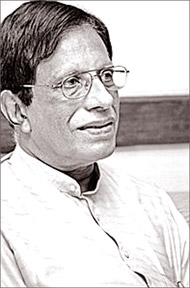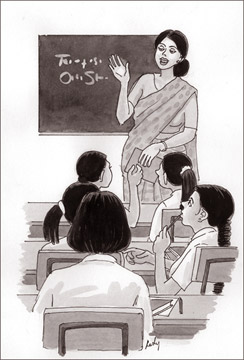|
Success due to Bottom-up planning:
Speaking English Sri Lankan way
Rasika Somarathna
In an interview with the Daily News
Coordinator of Presidential Task Force on ‘English as a life skill’
Sunimal Fernando outlines the novel approach taken to promote spoken
English skills, its aims, progress and the future plans
Q : The President as the Finance
Minister allocated Rs 750 million to the Education Ministry from
Budget-2011 to further propagate national initiative ‘English as a life
skill’, widely hailed as an unprecedented success. Whereas many such
previous attempts failed to achieve desired results, what in your view
was the current shift in policy and strategy which contributed to the
success?
|

Coordinator of Presidential Task Force on ‘English as a life
skill’
Sunimal Fernando |
A : Since its
implementation in June 2009, the image of the English language as a
weapon of social oppression and a statement of elitism has been
substantially - though not totally? transformed into that of an
essential life skill for communication, employment and as a vehicle for
reaching the outside world of knowledge. While Sri Lankan English is
being received as the informal spoken variety, international Standard
English is being accepted as the written form.
Today, we seek to teach spoken English in our schools and
institutions in keeping with our culture, traditions and customs
indigenous to Sri Lanka. It is taught purely as a life skill, a tool of
communication and not as a challenge to our own culture. Our primary
objective is to dispel the fear of English from the Sri Lankan mindset.
The national
road map to take communicative English skills across the
country, the Presidential initiative - ‘English as a life skill’
was launched in June 2009. The program aims at the dis-empowerment
of English as a privilege of the elites to be completed and
instead to see the empowerment of a new ideology of English as a
life skill.
It strives to make English a straight and simple tool of
communication stripped of its historical baggage, a skill for
employment and a vehicle for reaching the outside world of
knowledge. In other words English being transformed into a
common property, a resource owned by all. It aims to rid the
fear of speaking English from the Sri Lankan mindset.
According to experts the program so far owes its success to the
bottom-up, participatory planning through which those closest to
the grass roots (teachers and children) namely specially trained
Master Trainers have participated side by side with central and
provincial level educational officials in planning, designing
and monitoring the implementation of the policy and program.
Taking into account the progress of the initiative, its impact
and importance the President as the Minister of Finance
allocated an unprecedented Rs 750 million from the Budget-2011
to the Education Ministry for its implementation in year 2011.
|
There is so much English within us, but it does not come out due to
this fear psychosis created by an elite minority. Our intention is to
dispel this fear and take out what is within. In other words helping to
pull out the English which is already within our students.
Our intention is to promote spoken English, the Sri Lankan way, with
its own unique accent and manner of pronunciation. We strive to promote
English speaking in keeping with Sri Lanka’s culture devoid of the old
British flavour. We have established a strong new national cadre of
Master Trainers with another 320 Assistant Trainers to help them from
all nine provinces. They in turn are training the whole English Teaching
fraternity in this country who would pass on the knowledge to their
students. The country’s first Teacher Guide for spoken English was
produced, used and revised after one year by the new cadre of Master
Trainers. Plans are also afoot to educate English-speaking skills to the
whole teaching community of the country.
In this case success is due to multiple factors. But mainly it is due
the bottom-up approach we had adopted from the beginning. We based our
strategy taking into consideration what the grass roots wanted, their
ideas and concepts.
The President allocating such an unprecedented sum to carry forward
the program to the next level is testimony itself to the success we have
achieved so far.
Q : Can you elaborate more on this
bottom-up approach?
A : In the matter of
designing and programing the Presidential Task Force (PTF) is committed
to follow the guidelines provided by the President to whom it is
responsible and accountable. In this connection an important and
planning guideline the PTF has always followed is the practice of
bottom-up participatory planning through which those closest to the
grass roots (teachers and children), namely the specially trained
English Teacher Master Trainers have participated side by side with
central and provincial level educational officials in planning,
designing and monitoring the implementation of the policy and program of
the Presidential initiative.
To provide professionalism and discipline to this grass roots
oriented bottom-up planning, a leading professional in the field of
Participatory Planning and Monitoring Chamindra Weerackody was appointed
as honorary consultant to the PTF.

The main difference in our approach with previous ones was the
replacement of top-down planning with the bottom-up planning. While
planning was done by those closest to the grass root, in this case
teachers.
The bureaucrats and academia was encouraged to provide necessary
tools and assistance.
To be continued |



